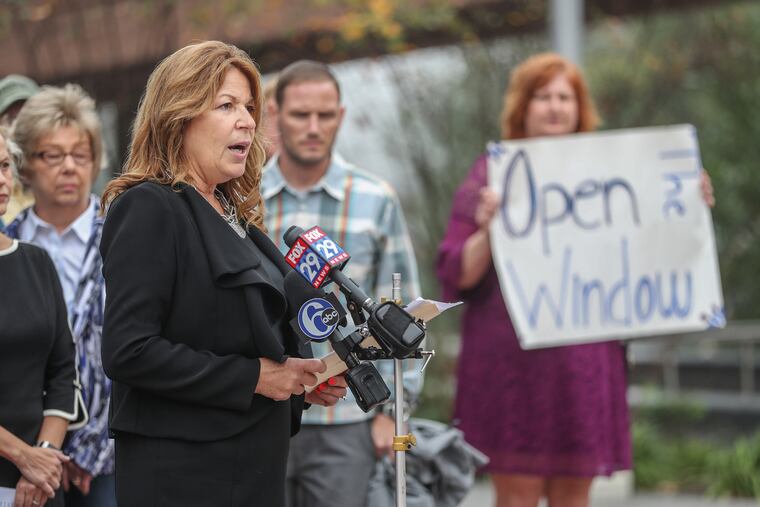Bucks judge dismisses Pa. Senate challenge over absentee ballots
State Rep. Tina Davis had argued Pennsylvania's absentee-ballot policy hindered voters' rights.

A Bucks County judge on Monday dismissed a legal challenge filed in a contested state Senate race that claimed Pennsylvania's deadline for excluding absentee ballots is unconstitutional.
State Rep. Tina Davis filed the lawsuit Nov. 19 after losing the race in the Sixth District to State Sen. Richard "Tommy" Tomlinson by just 74 votes. At least 216 absentee ballots went uncounted because they were received after the deadline but before Election Day, according to the filing.
Judge Jeffrey Finley did not provide an explanation for his ruling, which came hours after a hearing on the issue in Doylestown. Under his order, the absentee ballots will remained sealed, despite attempts by Davis' campaign to view a list of the voters who submitted them.
"Obviously it's disappointing, especially when you're not sure why you've lost," said Adam C. Bonin, the lawyer who filed the suit on behalf of Davis. "But we still want to know who these people are who cast these 216 ballots. We want to know how many of them were affected by unfair deadlines and delays."
Davis' campaign argued that budget cuts and scheduling changes by the U.S. Postal Service, as well as the closure of Croydon's post office due to a fire, made it impossible for some people to submit their absentee ballots within the deadline, depriving them of their rights under the Pennsylvania and U.S. Constitutions.
Bonin said during Monday's hearing that seeing the names would clearly demonstrate the flaws in the current ballot policy.
"If these ballots affected people who applied early and just dilly-dallied, it would essentially weaken our case," Bonin said. "Otherwise that information would demonstrate the burden of the statutory schedule."
But Joseph Pizzo, a lawyer representing Tomlinson's campaign, argued that a precedent set by a 1984 decision in Commonwealth Court – in which the court denied a request in Chester County to count absentee ballots received after the posted deadline – rendered Davis' lawsuit moot.
"Elections in this county have been operating under this election code for 87 years," Pizzo said. "In this particular matter, the rules for ballots decided the votes were invalid. That's the rules of the game."
Pennsylvania's election code allows counties to begin sending out absentee ballots two weeks before the election — although they can still be sent up to one week before — and requires voters to return them by 5 p.m. on the Friday before Election Day. Ballots received after that deadline, even if they come in to the county before the election, are not counted.
The policy is the subject of a larger legal challenge by the ACLU of Pennsylvania.
The civil rights organization argues on behalf of nine voters in its suit that the policy breaches the state constitution's guarantee that elections "shall be free and equal." The suit, similar to Davis', also argues that the law violates the Equal Protection Clause of the 14th Amendment.
Despite its failure, Davis' case revealed a glitch in the recent election beyond her district.
Election officials testified Monday that an unexplained issue with the county's Lower Government Center in Levittown caused 10 applications for absentee ballots to be received on the day those ballots were due. In response, Deanna Giorno, the county's chief clerk, reached out directly to the voters who filed them. Four of the applicants decided to vote in person, and five of the remaining six filled out absentee ballots that Giorno hand-delivered to them that day. It was unclear if the final voter returned the ballot Giorno delivered to him.
Davis' challenge had prevented the certification of the Sixth District results, and Finley's decision Monday effectively declared Tomlinson the winner. Davis, however, is still reporting to Harrisburg, having won a separate re-election bid for her seat in the House.
"I personally believe every vote should count," Davis said Monday. "Pennsylvania has the most restrictive laws in the country for absentee votes, and now that we have more Democrats in Congress, we should fix that."